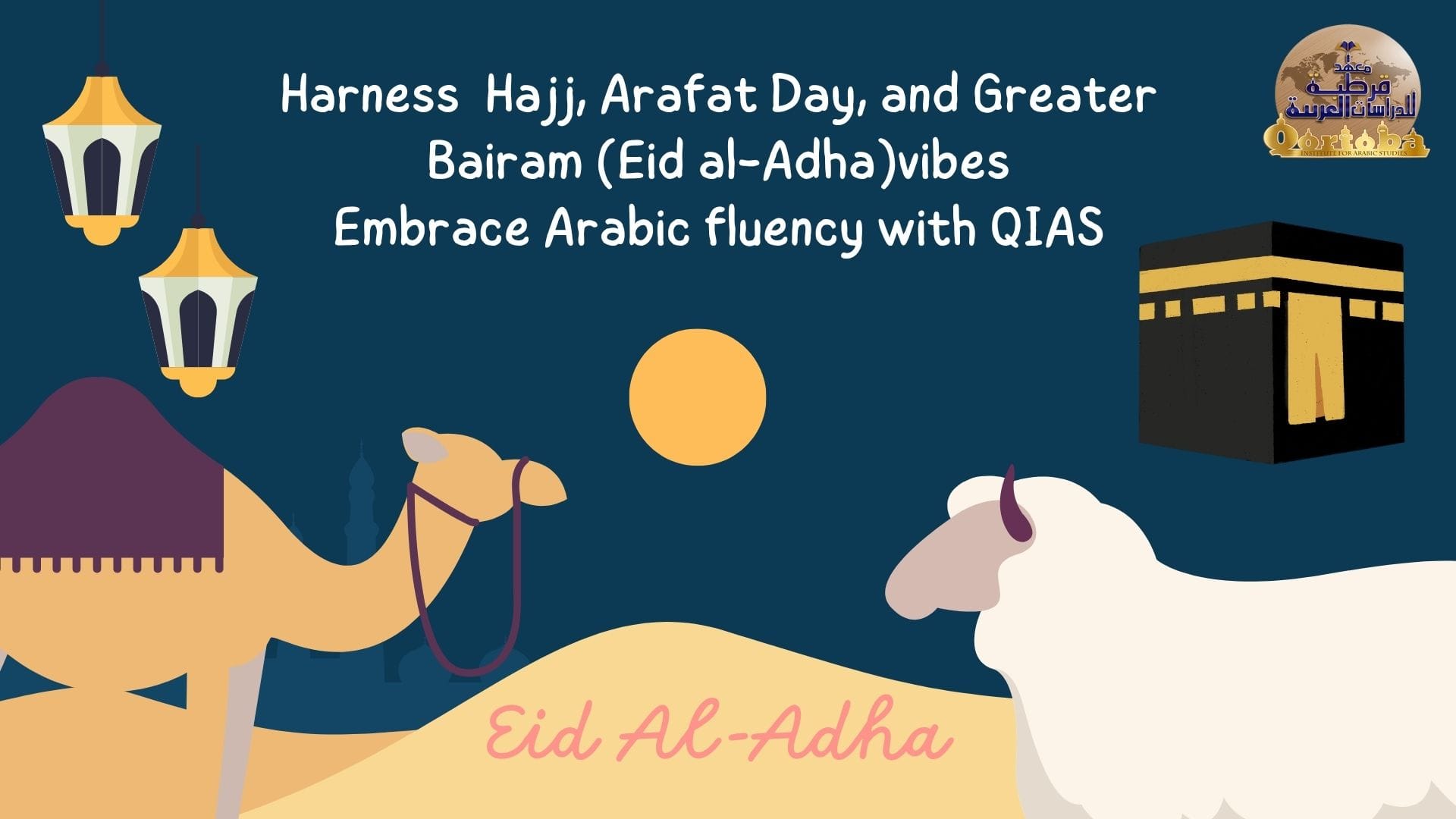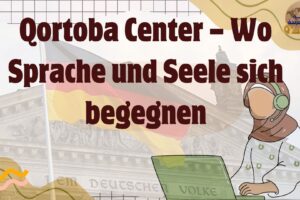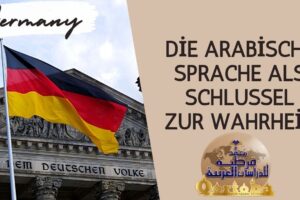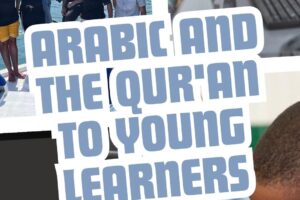
Harness Hajj, Arafat Day , and Greater Bairam (Eid al-Adha)vibes Embrace Arabic fluency with QIAS
Harness Hajj, Arafat Day ,
and Greater Bairam (Eid al-Adha)vibes Embrace Arabic fluency with QIAS
Islam, one of the world’s major religions, is deeply rooted in spiritual devotion, worship, and acts of sacrifice. Among its most revered practices is the annual pilgrimage to Mecca, known as Hajj, which is obligatory for all financially and physically capable Muslims at least once in their lifetime. Within this sacred journey, two significant observances— Arafat Day and Greater Bairam (Eid al-Adha) —hold profound religious and social importance . Hence, it is highly significant for non-native Muslim speakers across the globe such as in America, Britain, France,Germany and Canada to realize their precious value .Thus , QIAS (Qortoba Institution for Arabic Studies) highlights the theological, historical, and cultural dimensions of these events, elucidating their significance for Muslims worldwide – especially non-native Muslim speakers such as in America, Britain, France,Germany and Canada .
Hajj: The Pinnacle of Islamic Worship
Hajj, the fifth pillar of Islam, is a pilgrimage undertaken during the Islamic month of Dhul-Hijjah.
“وَأَذِّنْ فِي النَّاسِ بِالْحَجِّ يَأْتُوكَ رِجَالًا وَعَلَى كُلِّ ضَامِرٍ يَأْتِينَ مِنْ كُلِّ فَجٍّ عَمِيقٍ”
“And proclaim to the people the Hajj; they will come to you on foot and on every lean camel; they will come from every distant pass.”
It is a demonstration of unity, humility, and submission to Allah. Pilgrims perform a series of rituals, including circumambulating the Kaaba, walking between the hills of Safa and Marwa, and standing in prayer at Mount Arafat. The pilgrimage symbolizes spiritual purification, as it is believed that those who complete Hajj with sincerity emerge free from past sins.
Key Rituals of Hajj
Ihram (State of Purity): Pilgrims don white garments, symbolizing equality before Allah. They recite the Talbiyah:
لَبَّيْكَ اللَّهُمَّ لَبَّيْكَ، لَبَّيْكَ لاَ شَرِيكَ لَكَ لَبَّيْكَ، إِنَّ الْحَمْدَ وَالنِّعْمَةَ لَكَ وَالْمُلْك، لاَ شَرِيكَ لَكَ
“Here I am, O Allah, here I am. Here I am, You have no partner, here I am. Verily, all praise, grace, and sovereignty belong to You. You have no partner.”
Tawaf (Circumambulation of the Kaaba): Pilgrims walk seven times around the Kaaba, in Mecca, symbolizing devotion to Allah.
Sa’i (Walking Between Safa and Marwa): Pilgrims walk seven times between the hills, reenacting Hajar’s search for water for her son Ismail.
Standing at Arafat (Wuqoof): On the 9th day of Dhul-Hijjah, pilgrims congregate at Mount Arafat, engaging in deep prayer and supplication. It is the most critical day of Hajj, as sins are forgiven.
Stoning of the Devil (Ramy al-Jamarat): Pilgrims throw seven pebbles at three stone pillars in Mina, symbolizing the rejection of evil.
Sacrifice and Eid al-Adha: Pilgrims perform Qurban , marking the beginning of Eid al-Adha. They shave their heads ( men) or trim their hair ( women) as a sign of renewal.
Tawaf al-Ifadah and Farewell Tawaf: Pilgrims perform a final circumambulation of the Kaaba, concluding their sacred journey.
Arafat Day: The Day of Forgiveness
Arafat Day, observed on the ninth day of Dhul-Hijjah, is considered the most crucial day of Hajj. Pilgrims gather at the plains of Arafat, engaging in deep supplication and reflection. This d
ay commemorates the moment when Prophet Muhammad (peace be upon him) delivered his Farewell Sermon, emphasizing justice, equality, and devotion to God. Islamic teachings assert that fasting on Arafat Day for non-pilgrims expiates sins of the previous and upcoming year. It is a day of immense spiritual significance, marking divine mercy and forgiveness.
Greater Bairam (Eid al-Adha): The Festival of Sacrifice
Following Arafat Day, Muslims worldwide celebrate Eid al-Adha, also known as Greater Bairam. This festival honors the willingness of Prophet Ibrahim (Abraham) to sacrifice his son Ismail (Ishmael) in obedience to God’s command in his vision on sleeping . However, divine intervention replaced the child with a ram, signifying God’s mercy.
Traditions and Observances
1* Eid Prayer (Salat al-Eid): Muslims gather for a special two-unit (rak’ah) prayer followed by a sermon emphasizing faith, sacrifice, and charity. The Takbir is recited:
اللَّهُ أَكْبَرُ اللَّهُ أَكْبَرُ، لاَ إِلَهَ إِلاَّ اللَّهُ، وَاللَّهُ أَكْبَرُ، اللَّهُ أَكْبَرُ وَلِلَّهِ الْحَمْدُ
“Allah is the Greatest, Allah is the Greatest. There is no deity but Allah. Allah is the Greatest, Allah is the Greatest, and to Him belongs all praise.”
2* Sacrificial Ritual (Qurban): The ritual sacrifice of livestock takes place, and the meat is divided among family, relatives, and the poor.
“إِنَّا أَعْطَيْنَاكَ الْكَوْثَرَ فَصَلِّ لِرَبِّكَ وَانْحَرْ”
“Indeed, We have granted you, [O Muhammad], Al-Kawthar. So pray to your Lord and sacrifice [to Him alone].”
3* Feasting and Social Gatherings: Families prepare festive meals, exchange gifts, and extend goodwill to neighbors, irrespective of faith.
4* Charity and Helping Others: Muslims donate money, food, and clothes to the less fortunate, reinforcing the spirit of giving.
Common used Phrases in Hajj
Talbiyah (Chant of Devotion)
لَبَّيْكَ اللَّهُمَّ لَبَّيْكَ، لَبَّيْكَ لاَ شَرِيكَ لَكَ لَبَّيْكَ، إِنَّ الْحَمْدَ وَالنِّعْمَةَ لَكَ وَالْمُلْك، لاَ شَرِيكَ لَكَ
“Here I am, O Allah, here I am. Here I am, You have no partner, here I am. Verily, all praise, grace, and sovereignty belong to You. You have no partner.”
Hajj Greeting
حج مبرور وسعي مشكور
“May your Hajj be accepted and your efforts rewarded.”
Supplication at Arafat
اللهم اغفر لي وارحمني وتقبل مني دعائي
“O Allah, forgive me, have mercy on me, and accept my supplication.”
Prayer for Guidance
ربنا آتنا في الدنيا حسنة وفي الآخرة حسنة وقنا عذاب النار
“Our Lord, grant us good in this world and good in the Hereafter, and protect us from the punishment of the Fire.”
Common used Phrases in Eid al-Adha
Eid Mubarak Greeting
عيد مبارك
“Blessed Eid.”
Eid Sa’id (Happy Eid)
عيد سعيد
“Happy Eid.”
Traditional Blessing
كل عام وأنتم بخير
“May you be well every year.”
Prayer for Acceptance
تقبل الله منا ومنكم
“May Allah accept from us and from you.”
Takbir (Praise of Allah)
اللَّهُ أَكْبَرُ اللَّهُ أَكْبَرُ، لاَ إِلَهَ إِلاَّ اللَّهُ، وَاللَّهُ أَكْبَرُ، اللَّهُ أَكْبَرُ وَلِلَّهِ الْحَمْدُ
“Allah is the Greatest, Allah is the Greatest. There is no deity but Allah. Allah is the Greatest, Allah is the Greatest, and to Him belongs all praise.”
These phrases are widely used during Hajj and Eid al-Adha, reflecting devotion, gratitude, and communal unity.
Embrace Arabic fluency with QIAS
For non-native speakers in America, Britain, France, Germany and Canada who seek to engage with Arabic ,such an institution as QIAS( Qortoba Institution for Arabic Studies) is the alpha par excellence . As, QIAS provides non-native speakers students n educational e-platform for mastering the Arabic language and Qur’an .
1-Interactive Arabic courses
QIAS offers interactive Arabic online classes for adults and kids that cover Grammar, script ,the Arabic alphabet , Phonetics, conversation and Quranic Studies.QIAS employs engaging digital tools , up-to-date technology and audiovisual aids to enable non-native speakers students in America, Britain, France, Germany and Canada to access classical and contemporary Arabic language in an interactive atmosphere .
2-Immersive Arabic & Quraan learning program in Al-Madinah
Attain Arabic proficiency through immersive courses .Non-native speakers students in America, Britain, France, Germany and Canada professionally learn and practice rich grammatical structures & Arabic conversation in an immersive milieu .
3. Quranic Arabic Online Classes
Through interactive learning, QIAS e-platform equips students with the ability to engage with sacred texts in Arabic, fostering a deeper appreciation for verses of the Qur’an, ensuring that non-native speakers scholars in America, Britain, France, Germany and Canada engage meaningfully with sacred texts in their original linguistic form.
4-Quraan Memorization & Tajweed : online courses in reciting Quraan, Tajweed and memorization.
5-Innovative and Child-Friendly tutorials
To nurture Arabic proficiency among non-native speakers children in America, Britain, France ,Germany and Canada , QIAS incorporates storytelling, phonetic exercises, cutting edge technology,games and engaging digital tools into its curriculum, making language acquisition both fun and stimulating.
6-Edutainment Arabic & Quraan Summer learning Program in Egypt
Through immersive program ,non-native speakers students in America, Britain, France, Germany and Canada efficiently learn Arabic language in interactive and fun environment .
In summation,Hajj, Arafat Day, and Greater Bairam (Eid al-Adha) embody devotion, sacrifice, and unity. These observances not only strengthen individual spirituality but also reinforce communal bonds, transcending geographical and cultural boundaries. Therefore , QIAS (Qortoba Institution for Arabic Studies) capitalizes on such traditions. QIAS stands as a beacon of excellence, equipping non-native speakers learners in America, Britain, France, Germany and Canada with the expertise to master the Arabic language. Such an institution as QIAS is second to none in Arabic learning for non-native speakers scholars in America, Britain, France, Germany and Canada .
Tag:Arabic alphabet, Arabic Grammar, Arabic language, Arabic languages . Arabic languages . arabic alphabet . arabic alphabet in english . arabic curriculum for kids ., Arabic languages . Arabic languages . arabic alphabet . arabic alphabet in english . arabic curriculum for kids . muslim learn arabic, learn Arabic languages . Arabic languages . arabic alphabet . arabic alphabet in english . arabic curriculum for kids ., The importance of learning languages, world Arabic language day, world Arabic language day . française


















